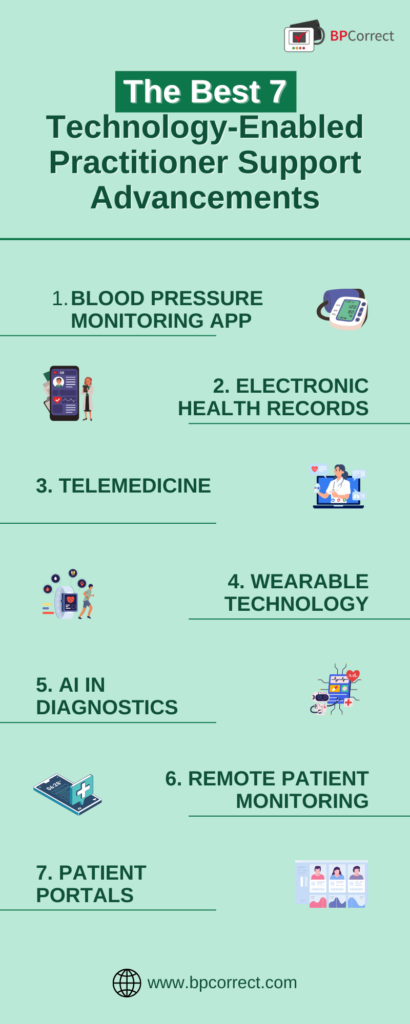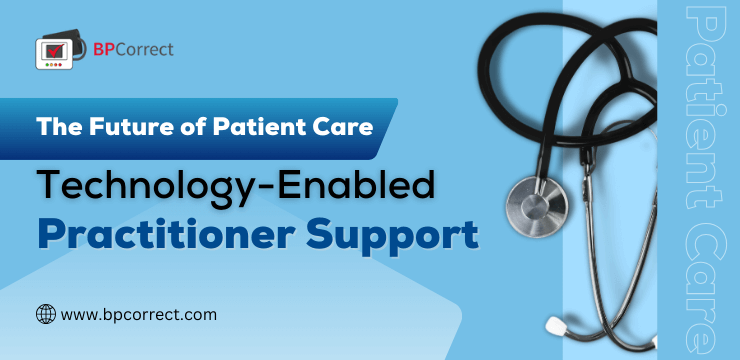The advancement in technology has taken over every sector, business, organization, and industry. Healthcare included. Doctors and medical experts worldwide are using technology and apps for patient care to provide better and more accessible healthcare to patients. However, it’s not as simple as that. Both practitioners and patients need to wrap their heads around advancements in medical technologies to leverage medical technologies to provide and receive improved healthcare properly. However, there will also be some challenges in implementing technology for patient care. We will try to cover this and more in today’s blog.
The Importance of Technology-Enabled Patient Care: 7 Benefits
These days, there is a higher emphasis on technology-enabled patient care. It is important because using tools and technology for healthcare drastically improves healthcare efficiency, accessibility, and quality. It enables healthcare professionals to:
- Access full patient information
- Make data-backed decisions
- Remotely monitor health conditions
- Provide better patient results
With that out of the way, the usage of technology and apps for patient care provides many advantages, which include:
1. Enhanced Access
The latest medical technologies enable doctors and patients to connect from anywhere and at any time. This saves time that you would have otherwise spent standing in long queues and ensures that geographical barriers are lifted. Overall, it allows better healthcare for even the underserved populations.
2. Better Data Management
Devices and apps for patient care including EHRs enable medical experts to centrally save patients’ information. This way, doctors can access medical history faster from anywhere. What it does is decrease errors and save time.
3. Anywhere Patient Monitoring
Medical experts can take care of their patients while not even being physically present with them by using wearable technologies and remote patient monitoring accessories. This enables:
- Detecting underlying health issues early.
- Interfering and starting treatment before it’s too late.
4. Personalized Treatment
Apps for patient care enable advanced data analytics. This can help doctors spot unusual patterns in patient information, which lets them curate personalized treatment based on individual requirements.
5. Decision Support
AI-enabled medical devices can provide practitioners with real-time healthcare decision support. Such technology can strongly suggest possible diagnoses and treatment choices based on specific patient information.
6. Efficiency Boosts
Using apps for patient care can optimize administrative work such as:
- Scheduling appointments
- Billing
What this does is save more time for medical practitioners to stay focused more on the health of their patients.
7. Patient Engagement
Mobile apps for patient care and patient portals let patients actively connect with their doctors and:
- Get access to medical records
- Timely manage their medications
- Communicate with their doctors
Read Also: Effortlessly Share Your Blood Pressure Data with the BPCorrect App
The Best 7 Technology-Enabled Practitioner Support Advancements

There are many technology-enabled practitioner support advancements available out there. You see, technology has become so advanced that, it has practical applications everywhere including healthcare and medicine. From anywhere information access to expanding medical reach, here are the top 7 most used technological advancements in the healthcare sector.
1. Blood Pressure Monitoring App
Blood pressure monitoring apps for patient care are applications that have to do something with monitoring and sharing the patients’ BP measurements with medical experts. For instance, an app such as BPCorrect can connect with any home blood pressure monitor you use. It synchronizes within 1-2 minutes, enabling you to directly share your BP measurements with your doctor at any time and from anywhere.
2. Electronic Health Records
As we mentioned before, electronic health records, or EHRs provide a centralized platform to save patients’ information. This ensures that the data is safe and secure. Plus, it’s quick and easy to find it whenever needed. Furthermore, doctors can also check the medical history of patients at any time and spot signs of danger for timely treatment.
3. Telemedicine
As the name suggests, telemedicine is a way for patients to receive healthcare from the comfort of their homes. By using technologies such as video calls or apps for patient care, patients can connect with their medical practitioners and receive treatments from the comfort of their homes. It is specifically useful for:
- People who have difficulty traveling
- Patients who live in remote areas that lack accessible healthcare facilities.
Did you know that around 78% of patients felt satisfied with telehealth and 68% of doctors reported they want to use telemedicine more?
4. Wearable Technology
People and patients around the world wear wearable healthcare devices and apps for patient care such as smartwatches and fitness trackers to continuously and in real-time track their health data. These are intelligent attachments with sensors that accurately track:
- Blood sugar
- Heart rate
- Sleep
- Activity levels
Wearing such a device is helpful as it provides you with useful insights into your health and wellness. Overall, wearing it makes it simpler for you to understand your body and choose a healthier lifestyle. Don’t believe us? Here are some facts and figures for you from a survey conducted in 2022.
- 49% of people reported being able to understand their health better.
- 27% of patients experienced improved quality of care.
- 15% of patients were able to receive remote healthcare.
- 5% of people reported easier collaboration with their medical practitioners.
- 4% of people experienced simplified healthcare management.
5. AI in Diagnostics
AI-enabled tools and apps for patient care are smart systems that accurately diagnose patients quicker than a doctor ever could. This data is based on 1000s of medical records, enabling the machines to detect similar vital signs and symptoms, suggesting better treatments on the spot.
6. Remote Patient Monitoring
This saves a lot of time for doctors as well as patients. Doctors can monitor patients without shifting their attention from crucial work. Patients too can receive healthcare from the comfort of their homes. It is useful for patients who have difficulties travelling. For example, elderly patients.
7. Patient Portals
apps for patient care such as BPCorrect provide patient and doctor portals as well from where they can see their medical data from anywhere. Overall, this improves patient engagement, providing a better healthcare experience.
Read Also: How BPCorrect Simplifies Blood Pressure Monitoring for Patients
5 Challenges in Implementing Technology for Patient Care
As we mentioned before, enabling technology-enabled practitioner support and patient care is not as simple as it sounds. There are also a few challenges in implementing technology for patient care including:
1. No Interoperability
Interoperability means the capability to share data with third parties. For example, electronic health records connect with partner hospitals’ devices. If this interoperability is not present, then the app for patient care is useless.
2. Data Privacy Issues
Another issue with technology in medical care is the issue with the privacy of patient data. Since the devices can read and store patient data at any time, the fear of data breaches is always there. However, apps such as BPCorrect strictly comply with the latest medical and security standards. So patient data is always safe.
3. Outdated Technologies
Using outdated technologies and apps for patient care or lack of awareness is a big issue when implementing technology in healthcare. The idea is that to implement the latest medical tools, the infrastructure must also be prepared, which can be expensive. However, apps such as BPCorrect need no infrastructure, only the internet to work, and thus are pocket-friendly.
4. Timely & Expensive
Implementing the technology in medical healthcare is also timely and expensive. Why? Because not only is the latest technology costly, but it also takes time to train doctors to use the tools. However, apps such as BPCorrect are easy to learn to use and are affordable for both doctors and patients.
5. Lack of Trust
Another issue with advanced technologies and apps for patient care is that patients don’t easily trust these devices and prefer traditional healthcare. Especially the elderly patients. However, BPcorrect can be easily trusted as it was made under the supervision of expert physicians and complies with the latest medical standards.
Conclusion
We now hope that you are clear about apps for patient care and technology-enabled practitioner support. Technology in the medical healthcare sector is the future. With technology becoming advanced and vast, spreading itself in every business, organization, sector, and industry including healthcare and fitness, medical practitioners and patients need to adapt to these technologies and applications to give and receive improved healthcare. However, it is also important to overcome the challenges associated with implementing these latest tech-enabled devices to gain the maximum healthcare benefits. Moreover, when it comes to apps such as BPCorrect, there are no issues in implementation whatsoever.
Frequently Asked Questions (FAQ)
Q. What are the Benefits of Technology-Enabled Patient Care?
Ans. Here are the benefits of technology-enabled patient care.
- Enhanced Access
- Better Data Management
- Remote Monitoring
- Personalized Treatment
- Decision Support
- Efficiency Boosts
- Better Patient Engagement
Q. What are the Best Advancements in Technology-Enabled Practitioner Support?
Ans. Below, we have mentioned 7 of the best technologies in medical healthcare.
- Blood Pressure Monitoring App
- Electronic Health Records
- Telemedicine
- Wearable Technology
- AI in Diagnostics
- Remote Patient Monitoring
- Patient Portals
Q. What are the Challenges in Implementing Healthcare Technology?
Ans. You will face the following issues while Implementing healthcare technology.
- No Interoperability
- Data Privacy Issues
- Outdated Technologies
- Timely & Expensive
- Lack of Patient Trust



